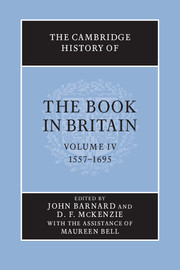Book contents
- Frontmatter
- Dedication
- Contents
- List of illustrations
- List of contributors
- Preface
- Acknowledgements
- Introduction
- RELIGION AND POLITICS
- ORAL TRADITIONS AND SCRIBAL CULTURE
- LITERATURE OF THE LEARNED
- 6 The Latin trade
- 7 Patronage and the printing of learned works for the author
- 8 University printing at Oxford and Cambridge
- 9 Editing the past: classical and historical scholarship
- 10 Maps and Atlases
- 11 The literature of travel
- 12 Science and the book
- 13 Samuel Hartlib and the commonwealth of learning
- 14 Ownership: private and public libraries
- 15 Monastic collections and their dispersal
- LITERARY CANONS
- VERNACULAR TRADITIONS
- THE BUSINESS OF PRINT AND THE SPACE OF READING
- BEYOND LONDON: PRODUCTION, DISTRIBUTION, RECEPTION
- DISRUPTION AND RESTRUCTURING: THE LATE SEVENTEENTH-CENTURY BOOK TRADE
- STATISTICAL APPENDICES
- Abbreviations
- Bibliography
- Index
- Plate Section
- References
13 - Samuel Hartlib and the commonwealth of learning
from LITERATURE OF THE LEARNED
- Frontmatter
- Dedication
- Contents
- List of illustrations
- List of contributors
- Preface
- Acknowledgements
- Introduction
- RELIGION AND POLITICS
- ORAL TRADITIONS AND SCRIBAL CULTURE
- LITERATURE OF THE LEARNED
- 6 The Latin trade
- 7 Patronage and the printing of learned works for the author
- 8 University printing at Oxford and Cambridge
- 9 Editing the past: classical and historical scholarship
- 10 Maps and Atlases
- 11 The literature of travel
- 12 Science and the book
- 13 Samuel Hartlib and the commonwealth of learning
- 14 Ownership: private and public libraries
- 15 Monastic collections and their dispersal
- LITERARY CANONS
- VERNACULAR TRADITIONS
- THE BUSINESS OF PRINT AND THE SPACE OF READING
- BEYOND LONDON: PRODUCTION, DISTRIBUTION, RECEPTION
- DISRUPTION AND RESTRUCTURING: THE LATE SEVENTEENTH-CENTURY BOOK TRADE
- STATISTICAL APPENDICES
- Abbreviations
- Bibliography
- Index
- Plate Section
- References
Summary
Does Samuel Hartlib deserve prominence in a history of the book in Britain? He wrote little and claimed even less in print, a modest publisher with an indifferent commercial record. He was not a scholar, held no university degree, and did not own a large library. Yet he is an exemplary and contextual figure in the history of the book. He was a specialist in the collection, organization and distribution of knowledge, and his convictions tell us a good deal about how he interpreted the place of books in the commonwealth of learning. Moreover, his role as a publicist during England’s mid-century ‘troubles’ illustrates the complex interplay between printing, scribal publication and private correspondence, enabling Hartlib to serve as a vital point of contact between England and the république des lettres. Hartlib and his English associates preferred the term ‘Common-wealth of Learning’. It expressed their somewhat naïve transactional view of information flow and commodified knowledge, and stressed the significance of public access to it. The chance survival of Hartlib’s papers, lost from sight shortly after his death until their rediscovery in 1933, enables us to recover the aspirations and activities of this ‘intelligence’.
‘The greatest instrument of public edification’
Samuel Hartlib was a self-effacing publicist who side-stepped the civilities that we have come to see as significant in the verification of science in the seventeenth century. Asserting no gentility or prior knowledge as to where truth might lie or be found, ‘Albureth’ (the magus-like anagram he occasionally adopted) placed the reliability and verifiability of knowledge in the public domain.
- Type
- Chapter
- Information
- The Cambridge History of the Book in Britain , pp. 304 - 322Publisher: Cambridge University PressPrint publication year: 2002
References
- 4
- Cited by

